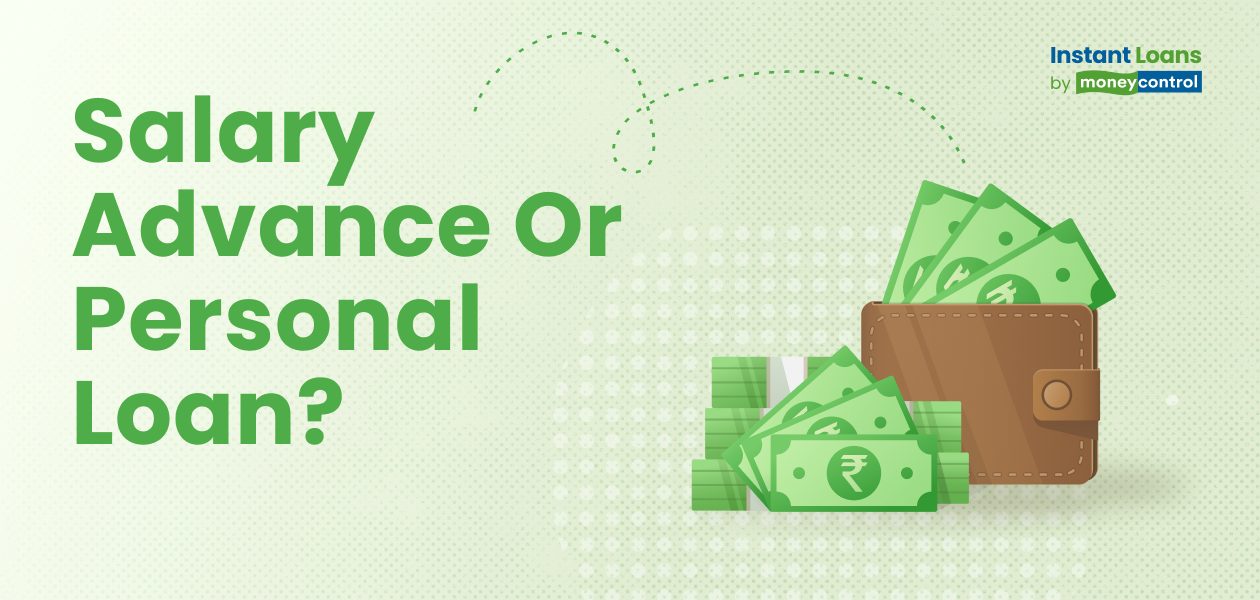18 June, 2025 | 11:00 IST

When you need quick money for short-term needs, it can be confusing to choose the right type of loan. Two popular options are salary advance and personal loan. They are used for different situations and have distinct features.
Table of Contents
A salary advance is a small loan given by your employer (or sometimes by a financial company). It helps you manage expenses before your next paycheck. The amount depends on your salary and is usually small. Not all salary advances are treated as loans. When given by an employer, a salary advance is considered an advance against your future salary without incurring any interest. However, you need go through a formal application process for the same.
A personal loan, on the other hand, is given by banks or other financial institutions. You can borrow a larger amount compared to a salary advance.
Both loans are unsecured, meaning you don’t need to put any property or asset as a guarantee. You need to show proof of your income. You can use the money for anything, like emergencies, weddings, or other purchases.
Personal loans cover a broader segment and are typically much higher in value compared to salary advance. While some financial institutions offer salary advance up to Rs 5 lakh, personal loans can go up to Rs 50 lakhs or even more.
You can apply for personal loans up to Rs 50 lakhs from upto eight lenders on the Moneycontrol app or website. The process is fully digital. Approvals are quick. Disbursal takes minutes to a few hours. The money goes directly to your bank and the interest rates start from 10.5% per annum.
What sets personal loans apart from other types of loans is that they require a minimal documentation process for approval. Most lenders offer a digital application process, making it convenient and fast.
For a salary advance loan, eligibility is usually limited to salaried individuals with a stable monthly income. Lenders may require proof of employment and income slips. Some financial institutions also consider your credit behaviour, but documentation is minimal. These loans are generally offered to individuals working in reputed private or government organisations.
For a personal loan, both salaried and self-employed individuals can apply. Here, factors like age, income, credit score, employment type and work experience play a key role. Many lenders cap the eligible loan amount at 10 to 24 times the applicant’s net monthly income. A commonly followed practice is capping the loan at 15 times the monthly salary to ensure repayment ability. The upper limit may vary from 10 to 24 times your net monthly salary depending on your credit profile and repayment capacity.
The terms for getting a salary advance can differ depending on who is offering it. If it is given by your employer, it usually comes with no interest, but this is reliant upon the agreement between you and your employer.
If the salary advance is taken from a financial institution, interest rates can be high around 12% to 36% per annum or higher. When considered monthly it can be around 1% to 3% per month. The final terms are determined by factors like your credit history, salary amount, employer’s reputation, and other criteria.
Similarly, getting a personal loan also depends on several things such as your salary, credit score (CIBIL score generally), past borrowing history and your relationship with the lender. The interest rate on personal loans varies too. A good credit score or a strong banking relationship can help you get lower rates. Personal loan interest rates usually start from around 10.5% per year and can go up to 40% per year.
You can get instant personal loans up to Rs 50 lakhs through the Moneycontrol app or website. Choose from eight trusted lenders, enjoy a fully digital process, quick approval and funds transferred within hours. Interest rates start as low as 10.5% per annum.
Personal loans are designed for a long-term structure and repayment terms can last up to five to seven years. Certainly, a longer repayment period would mean reduced monthly EMI, but this also means accumulation of significant interest over the years.
In case of salary advance loans, the tenure is not as long as personal loans because the amount is smaller. Lenders typically offer salary advances for a period for one month to a maximum of 12 months. There can be exceptions depending on the terms of a specific lender.
Personal loans offer larger loan amounts with flexible repayment options and generally lower interest rates. This makes them more suitable for bigger expenses like weddings, home renovations, or debt consolidation.
Salary advances are meant for smaller, short-term needs and may come with higher interest rates, especially when taken from financial institutions instead of employers. They are ideal for urgent, low-value expenses like medical bills or emergency repairs.
When choosing between the two, it is important to compare key factors like interest rate, repayment period, loan amount and how quickly you need the funds. Most importantly, the loan should fit well within your financial plan to avoid unnecessary stress later.
Share it in your circle
Table of Contents
Explore Top Lenders for Instant Loan upto
Get Instant Loan up to ₹50 Lakhs with Zero Paperwork from Top Lenders
 100% Digital
100% Digital Quick Disbursal
Quick Disbursal Low Interest Rates
Low Interest Rates